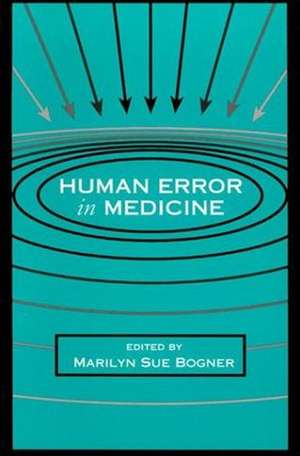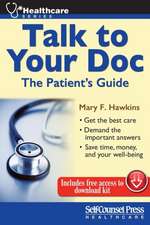Human Error in Medicine: Human Error and Safety
Editat de Marilyn Sue Bogneren Limba Engleză Hardback – iul 1994
* inadequacies or ambiguity in the design of a medical device or institutional setting for the delivery of medical care;
* inappropriate responses to antagonistic environmental conditions such as crowding and excessive clutter in institutional settings, extremes in weather, or lack of power and water in a home or field setting;
* cognitive errors of omission and commission precipitated by inadequate information and/or situational factors -- stress, fatigue, excessive cognitive workload.
The first to address the subject of human error in medicine, this book considers the topic from a problem oriented, systems perspective; that is, human error is considered not as the source of the problem, but as a flag indicating that a problem exists. The focus is on the identification of the factors within the system in which an error occurs that contribute to the problem of human error. As those factors are identified, efforts to alleviate them can be instituted and reduce the likelihood of error in medical care.
Human error occurs in all aspects of human activity and can have particularly grave consequences when it occurs in medicine. Nearly everyone at some point in life will be the recipient of medical care and has the possibility of experiencing the consequences of medical error. The consideration of human error in medicine is important because of the number of people that are affected, the problems incurred by such error, and the societal impact of such problems. The cost of those consequences to the individuals involved in medical error, both in the health care providers' concern and the patients' emotional and physical pain, the cost of care to alleviate the consequences of the error, and the cost to society in dollars and in lost personal contributions, mandates consideration of ways to reduce the likelihood of human error in medicine.
The chapters were written by leaders in a variety of fields, including psychology, medicine, engineering, cognitive science, human factors, gerontology, and nursing. Their experience was gained through actual hands-on provision of medical care and/or research into factors contributing to error in such care. Because of the experience of the chapter authors, their systematic consideration of the issues in this book affords the reader an insightful, applied approach to human error in medicine -- an approach fortified by academic discipline.
| Toate formatele și edițiile | Preț | Express |
|---|---|---|
| Paperback (1) | 597.43 lei 6-8 săpt. | |
| CRC Press – iul 1994 | 597.43 lei 6-8 săpt. | |
| Hardback (1) | 1119.13 lei 6-8 săpt. | |
| CRC Press – iul 1994 | 1119.13 lei 6-8 săpt. |
Preț: 1119.13 lei
Preț vechi: 1364.79 lei
-18% Nou
Puncte Express: 1679
Preț estimativ în valută:
214.15€ • 228.100$ • 178.55£
214.15€ • 228.100$ • 178.55£
Carte tipărită la comandă
Livrare economică 17 aprilie-01 mai
Preluare comenzi: 021 569.72.76
Specificații
ISBN-13: 9780805813852
ISBN-10: 0805813853
Pagini: 428
Dimensiuni: 152 x 229 x 32 mm
Greutate: 0.74 kg
Ediția:1
Editura: CRC Press
Colecția CRC Press
Seria Human Error and Safety
ISBN-10: 0805813853
Pagini: 428
Dimensiuni: 152 x 229 x 32 mm
Greutate: 0.74 kg
Ediția:1
Editura: CRC Press
Colecția CRC Press
Seria Human Error and Safety
Public țintă
Academic, Professional, and Professional Practice & DevelopmentCuprins
Contents: J.T. Reason, Foreword. M.S. Bogner, Introduction. L.L. Leape, The Preventability of Medical Injury. J.A. Perper, Life-Threatening and Fatal Therapeutic Misadventures. H. Van Cott, Human Errors: Their Causes and Reduction. N. Moray, Error Reduction as a Systems Problem. G. Vroman, I. Cohen, N. Volkman, Misinterpreting Cognitive Decline in the Elderly: Blaming the Patient. R.L. Klatzky, J. Geiwitz, S.C. Fischer, Using Statistics in Clinical Practice: A Gap Between Training and Application. T.B. Sheridan, J.M. Thompson, People Versus Computers in Medicine. J.W. Senders, Medical Devices, Medical Errors, and Medical Accidents. D.I. Serig, Radiopharmaceutical Misadministrations: What's Wrong? D.M. Gaba, Human Error in Dynamic Medical Domains. R.L. Helmreich, H-G. Schaefer, Team Performance in the Operating Room. R.I. Cook, D.D. Woods, Operating at the Sharp End: The Complexity of Human Error. G.P. Krueger, Fatigue, Performance, and Medical Error. W.A. Hyman, Errors in the Use of Medical Equipment. M.H. Applegate, Diagnosis-Related Groups: Are Patients in Jeopardy? M.S. Bogner, Human Error in Medicine: A Frontier for Change. J. Rasmussen, Afterword.
Recenzii
"I recommend this book to health care providers who perceive that their institution has a problem with errors that never seems to get fixed. This book may enlighten these providers and help them see why fixes that ignore the system itself do not and will not work."
—American Journal of Health-System Pharmacists
"...contains contributions from nearly all of the important workers in the area of human error in medicine....A great deal of currently relevant information is presented, which has been distilled into a very readable book. This is a must for anyone with an interest in the area."
—Anaesthesia and Intensive Care
"One of the few 'page turners' in the human factors literature. Whether you're a health care or human factors professional, a medical device developer, or a potential future patient, this book is worth a look."
—Ergonomics in Design
"Bogner pulls together an impressive array of multidisciplinary authors, and each chapter is enlightening, informative, and at times even exciting to read....The book will make excellent reading for all practitioners who wish to minimize errors by better understanding their cause, all administrators who wish to minimize errors by developing better systems, and all students of human behavior and medical decision making."
—JAMA
"For anyone interested in imperfect decisions, Human Error in Medicine provides a fascinating overview of this subtopic from a variety of disciplinary perspectives."
—Medical Decision Making
"People make errors, which lead to accidents. Accidents lead to deaths. The standard solution is to blame the people involved. If we find out who made errors and punish them, we solve the problem, right? Wrong. The problem is seldom the fault of an individual; it is the fault of the system. Change the people without changing the system and the problems will continue. It is only through system analysis that we have any chance of reducing the incidence of error, which is why this book is so important. This book brings together leading authorities on the analysis of human error. Most prior research on error has been in industrial settings. Accidents in the aviation or nuclear power industries are rare, but because of their magnitude, they receive considerable publicity. Accidents and deaths from human error within medicine are unpleasantly common, but because each is relatively unique, affecting primarily a single patient, they are not much noticed. Any professional who has examined the hospital setting sees it as a clear textbook case for the occurrence of human error: pills with different characteristics, but similar appearances and names; equipment made by different manufacturers with widely different design philosophies; lack of standards; frequent shift and personnel changes; social hierarchies where the person with the most knowledge is not necessarily the person with the decision-making authority; and high stress and fatigue. The real wonder is that there are not more accidents. Modern cognitive science can make a difference. When people think of 'human factors,' they usually think of the physical factors in design -- knobs and dials. These are important, but the most serious errors result from cognitive factors, from mental workload and faulty mental models, or from problems with mappings and conflicting conceptualizations. It is these factors that need to be addressed, factors covered in the new disciplines of cognitive engineering and cognitive ergonomics. This important book points the way."
—Donald A. Norman
Apple Fellow, Apple Computer Inc. Professor of Cognitive Science, Emeritus, Univ
"It is a book that is overdue. It presents an eclectic collection of essays, knit together by an emphasis on the systems approach, by many of our leaders in the field of human error who are now setting their sights on medicine. An interesting feature of the book is its diversity. It reports everything from demographic statistics to case studies and experiments. It considers error in the gamut of situations from diagnosis to treatment, from admission to discharge, and even from womb to tomb."
—Richard W. Pew, Ph.D.
Principle Scientist, BBN Inc.
"This book -- the first of its nature -- is a timely and important addition to our continuing concerns about health care. Scientifically based and empirically sound, this comprehensive research from the best scholars in the field covers the range of human factors that influence avoidable medical error. Though it may be too early to call it so, Human Error in Medicine is destined to become a classic in the field and is a necessary handbook for the professional, the politician and the public with interest in medical health care."
—Bonnie R. Strickland, Ph.D.
University of Massachusetts, Amherst
—American Journal of Health-System Pharmacists
"...contains contributions from nearly all of the important workers in the area of human error in medicine....A great deal of currently relevant information is presented, which has been distilled into a very readable book. This is a must for anyone with an interest in the area."
—Anaesthesia and Intensive Care
"One of the few 'page turners' in the human factors literature. Whether you're a health care or human factors professional, a medical device developer, or a potential future patient, this book is worth a look."
—Ergonomics in Design
"Bogner pulls together an impressive array of multidisciplinary authors, and each chapter is enlightening, informative, and at times even exciting to read....The book will make excellent reading for all practitioners who wish to minimize errors by better understanding their cause, all administrators who wish to minimize errors by developing better systems, and all students of human behavior and medical decision making."
—JAMA
"For anyone interested in imperfect decisions, Human Error in Medicine provides a fascinating overview of this subtopic from a variety of disciplinary perspectives."
—Medical Decision Making
"People make errors, which lead to accidents. Accidents lead to deaths. The standard solution is to blame the people involved. If we find out who made errors and punish them, we solve the problem, right? Wrong. The problem is seldom the fault of an individual; it is the fault of the system. Change the people without changing the system and the problems will continue. It is only through system analysis that we have any chance of reducing the incidence of error, which is why this book is so important. This book brings together leading authorities on the analysis of human error. Most prior research on error has been in industrial settings. Accidents in the aviation or nuclear power industries are rare, but because of their magnitude, they receive considerable publicity. Accidents and deaths from human error within medicine are unpleasantly common, but because each is relatively unique, affecting primarily a single patient, they are not much noticed. Any professional who has examined the hospital setting sees it as a clear textbook case for the occurrence of human error: pills with different characteristics, but similar appearances and names; equipment made by different manufacturers with widely different design philosophies; lack of standards; frequent shift and personnel changes; social hierarchies where the person with the most knowledge is not necessarily the person with the decision-making authority; and high stress and fatigue. The real wonder is that there are not more accidents. Modern cognitive science can make a difference. When people think of 'human factors,' they usually think of the physical factors in design -- knobs and dials. These are important, but the most serious errors result from cognitive factors, from mental workload and faulty mental models, or from problems with mappings and conflicting conceptualizations. It is these factors that need to be addressed, factors covered in the new disciplines of cognitive engineering and cognitive ergonomics. This important book points the way."
—Donald A. Norman
Apple Fellow, Apple Computer Inc. Professor of Cognitive Science, Emeritus, Univ
"It is a book that is overdue. It presents an eclectic collection of essays, knit together by an emphasis on the systems approach, by many of our leaders in the field of human error who are now setting their sights on medicine. An interesting feature of the book is its diversity. It reports everything from demographic statistics to case studies and experiments. It considers error in the gamut of situations from diagnosis to treatment, from admission to discharge, and even from womb to tomb."
—Richard W. Pew, Ph.D.
Principle Scientist, BBN Inc.
"This book -- the first of its nature -- is a timely and important addition to our continuing concerns about health care. Scientifically based and empirically sound, this comprehensive research from the best scholars in the field covers the range of human factors that influence avoidable medical error. Though it may be too early to call it so, Human Error in Medicine is destined to become a classic in the field and is a necessary handbook for the professional, the politician and the public with interest in medical health care."
—Bonnie R. Strickland, Ph.D.
University of Massachusetts, Amherst
Descriere
This edited collection of articles addresses aspects of medical care in which human error is associated with unanticipated adverse outcomes




















